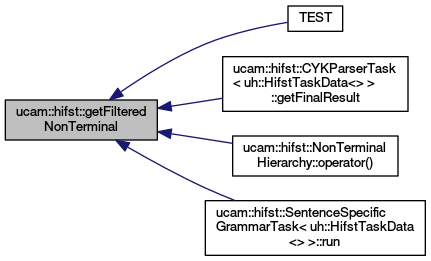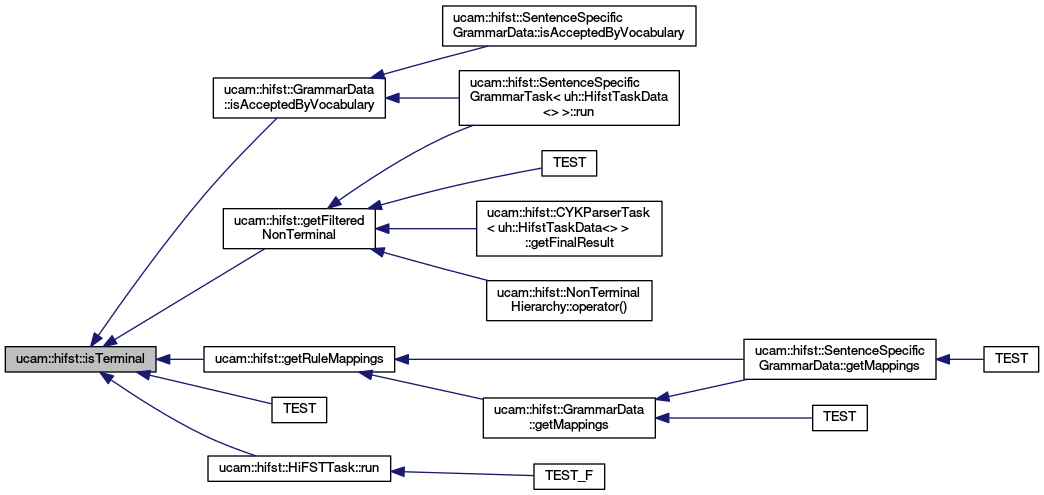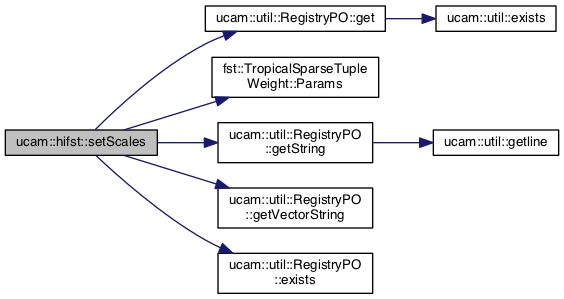|
| class | AlilatsToSparseWeightLatsData |
| | Data class containing relevant variables. To be used as template for task classes using it. More...
|
| |
| class | CompareTool |
| | Class that provides basic string comparison between two const char *. More...
|
| |
| struct | conditions |
| | struct containing the elements that trigger local pruning. More...
|
| |
| class | CYKbackpointers |
| | functor that provides cyk backpointers More...
|
| |
| struct | CYKdata |
| | Data structure containing all cyk-related information. More...
|
| |
| class | CYKgrid |
| | functor that provides cykgrid access methods More...
|
| |
| class | CYKParserTask |
| | Implements cyk+ parser. More...
|
| |
| class | DumpNbestFeaturesTask |
| | Task that dumps nbest and feature file. Templated on specific Data object and Fst Arc. More...
|
| |
| class | ExpandedNumStatesRTN |
| | Utility class that, given an RTN with root at (cc,x,y), estimates the number of states of an expanded FSA The RTN is not explicitly passed to this class. Instead, it is updated sequentially as individual FSAs are created. More...
|
| |
| struct | GenerateTrivialFst |
| |
| struct | GrammarData |
| | Struct containing grammar rules. More...
|
| |
| class | GrammarTask |
| | Task class that loads a grammar into memory. More...
|
| |
| class | HifstClientTaskData |
| | Data class containing relevant variables. To be used as template for task classes using it. More...
|
| |
| class | HifstServerTask |
| | Translation Server. More...
|
| |
| class | HifstStatsTask |
| | Reads StatsData and dumps all stats to (sentence-specific) file. Provides a special method for cyk data: dumps a grid in text format with relevant information per cell. More...
|
| |
| class | HiFSTTask |
| | Core of Hifst. Implements the lattice-building procedure for a cyk-parsed sentence. More...
|
| |
| class | HifstTaskData |
| | Data class containing relevant variables. To be used as template for task classes using it. More...
|
| |
| class | LoadSparseWeightFlowerLatticeTask |
| | Implements a class that loads the grammar sparseweight flower lattice and stores a pointer on the data object. More...
|
| |
| class | LoadSparseWeightsTask |
| |
| class | LocalPruningConditions |
| | convenience class that takes care of local pruning conditions. Conditions are indexed by 1000*cc+y, so you can search through all conditions and get to the closest set of conditions that apply. More...
|
| |
| struct | MakeWeightHifst |
| |
| struct | MakeWeightHifst< fst::LexStdArc > |
| |
| struct | MakeWeightHifst< TupleArc32 > |
| |
| struct | MakeWeightHifstLocalLm |
| |
| struct | MakeWeightHifstLocalLm< fst::LexStdArc > |
| |
| struct | MakeWeightHifstLocalLm< TupleArc32 > |
| |
| class | ManualReplaceFstByArc |
| | Creates FST replacement or not depending on conditions including program options. More...
|
| |
| class | MultiThreadedAliLatsToSparseVecLatsTask |
| | Multithreaded implementation of alilats2splats pipeline. More...
|
| |
| class | MultiThreadedCreateSentenceSpecificGrammarTask |
| | Full multi-threaded Translation system. More...
|
| |
| class | MultiThreadedHifstTask |
| | Full multi-threaded Translation system. More...
|
| |
| class | NonTerminalHierarchy |
| | This is a functor with additional methods to include relevant rules (i.e. identify SCFG rules, S -> X X, X -> V V ) and determine the hierarchy of non-terminals within the grammar. More...
|
| |
| class | OptimizeMachine |
| |
| class | OptimizeMachineNoDetMin |
| |
| class | PatternCompareTool |
| | Class that provides "pattern" comparison between two const char *. The "patterns" are an abstraction of any non-terminal A-Z. So for instance, consider non_terminals A and Z. A rule with source 3_A_5 and another one with source 3_Z_5 are equivalent and need to be listed together (with any other equivalent sources). This class can be used with PosIndexCompare as it inherits from CompareTool. More...
|
| |
| class | PatternsToInstancesTask |
| | Converts patterns to instanced patterns. More...
|
| |
| struct | posindex |
| | Struct containing rule positions and offsets. More...
|
| |
| class | PosIndexCompare |
| | Functor Class that provides comparison accross the posindex structure. This is typically used e.g. with a priority queue. It can use CompareTool or any inherited class. More...
|
| |
| class | PostProTask |
| | Task that writes translation to a text file. This translation might be recased, wordmapped and tokenized. More...
|
| |
| class | PreProTask |
| | Reads text file, performs tokenization and integer-mapping. More...
|
| |
| class | ReferenceFilterTask |
| | Generates a substring version of a reference translation lattice and associated vocabulary. This substring fst is typically used to guide translation towards a particular search space. The associated vocabulary can be used e.g. to restrict parsing algorithms. More...
|
| |
| class | ReplaceFstByArc |
| | Creates FST replacement or not depending on conditions. More...
|
| |
| class | RTN |
| | Convenience class that stores pointers to cell FSAs. These pointers are organized through a hash using a label built from (cc,x,y) as key. More...
|
| |
| class | RuleIdsToSparseWeightLatsData |
| | Data class containing relevant variables. To be used as template for task classes using it. More...
|
| |
| struct | RulesToWeightsMapperObject |
| |
| struct | SentenceSpecificGrammarData |
| | Structure for sentence-specific grammar Rules will be queried by cyk per position and number of elements in the right-hand-side (source) of the rule Therefore indices are stored in this fashion so queries can be done directly. Note: a more efficient implementation could be to store these rule indices in a structure much closer even to the cyk grid. For instance, if an instanced pattern has never been seen below span 5, there is no need for the cyk to query and reject it. More...
|
| |
| class | SentenceSpecificGrammarTask |
| | This class uses instantiated patterns to analyze the grammar and deliver two hashes providing candidate rules for a (cyk) parser to validate them. The first hash is for rules with only one element (e.g. A->word, A->B). The second hash is for rules with two or more elements. Both hashes require two keys: the word position in the sentence (x) and the first element of the rule (which can be either a word or non-terminal). More...
|
| |
| class | SingleThreadedAliLatsToSparseVecLatsTask |
| | Full single-threaded Alignment lattices to Sparse lattices. More...
|
| |
| class | SingleThreadedCreateSentenceSpecificGrammarTask |
| | Full single-threaded Translation system. More...
|
| |
| class | SingleThreadededRulesToWeightsSparseLatsTask |
| | Full single-threaded Alignment lattices to Sparse lattices. More...
|
| |
| class | SingleThreadedHifstClientTask |
| | Full single-threaded Translation system. More...
|
| |
| class | SingleThreadedHifstTask |
| | Full single-threaded Translation system. More...
|
| |
| class | SparseWeightVectorLatticesTask |
| | Creates lattices using tropical tuple weight semiring – each arc containing separate feature weight contributions. Note that the semiring is tropical under dot product of all these features with its scales. More...
|
| |
|
| const uint | getSize (const std::string &rhs) |
| | A generic element counter that can be used to any string. It is intended to use with either source or target side of a rule (right-hand side parts of the synchronous rule). More...
|
| |
| bool | isTerminal (const std::string &word) |
| | Determine if the element is a terminal (i.e. a word, represented by a number) or a non-terminal (i.e. ^[A-Z]+(0-9)?). Only first position is checked. More...
|
| |
| void | getFilteredNonTerminal (std::string &word) |
| | Return the filtered non-terminal name. For example, for the rule Z 3_XT2_5 XT2, getFilteredNonTerminal("XT2") should return XT. More...
|
| |
| void | getRuleMappings (const std::vector< std::string > &source, const std::vector< std::string > &translation, unordered_map< uint, uint > *mappings) |
| | Given a source and translation of the same rule, sharing the same non-terminals in RHS, returns correspondences between source and target non-terminal indices. For example: X a_Y_Z_b c_Z_Y_d: mappings[0]=1; mappings[1]=0. More...
|
| |
| bool | phraseIsTerminalWord (const std::string &phrase) |
| |
| void | setScales (const ucam::util::RegistryPO &rg, unsigned *offset, const std::string &lmscales=HifstConstants::kLmFeatureweights, const std::string &grammarscales=HifstConstants::kRuleflowerlatticeFeatureweights, const std::string &featureweights=HifstConstants::kFeatureweights, const std::string &lmload=HifstConstants::kLmLoad) |
| | Sets scales using environment parameter (see sparse tuple weight semiring file), or grammar scales and language model scales. If these are active, the environment parameter will not be used. More...
|
| |
| int | getLocalLmIndex (ucam::util::RegistryPO const *rg=NULL) |
| |










